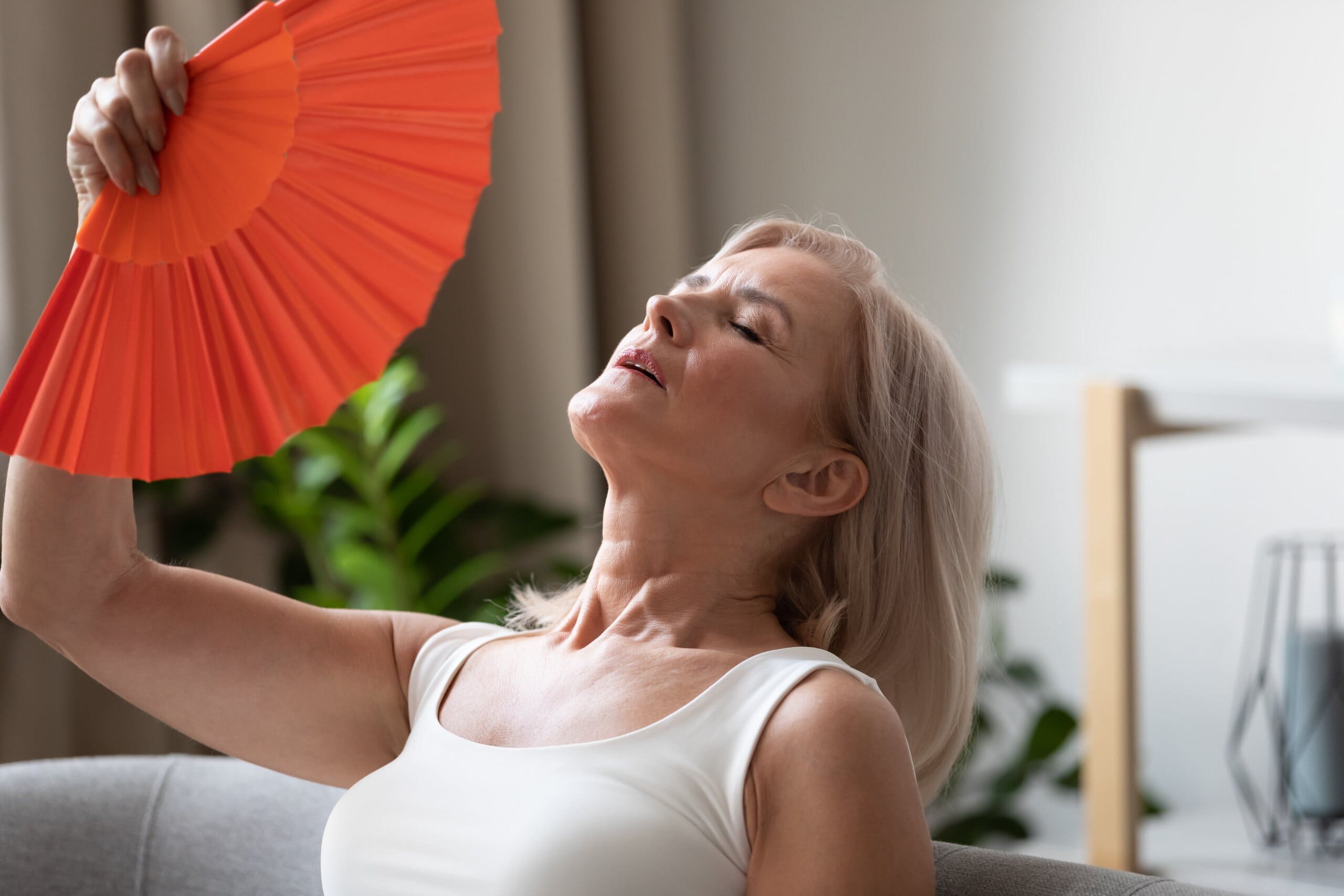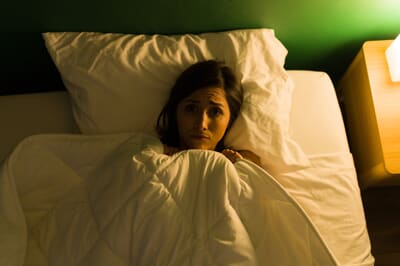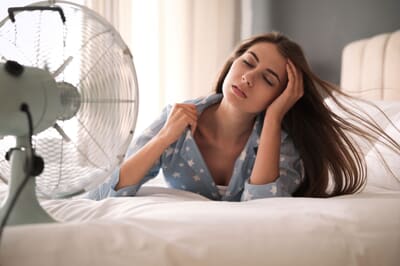Menopause is a fact of life for many women. If you’ve not gone through it yourself, you’ve probably heard from friends and family members how awful the symptoms can be while you’re in it, but how freeing the feeling afterwards is.
Mood swings, weight gain and hot flushes are just some of the symptoms of the menopause, although the severity differs with each woman.
However, 60% of women experience sleep disturbance at some point during the menopausal transition, including the perimenopausal stage (the period of time before the menopause kicks in). These sleep problems can stick around, with one of the most common symptoms of the menopause being hot flashes and night sweats.
So, with this in mind, we've shared our expert tips on how to stop menopause night sweats below.
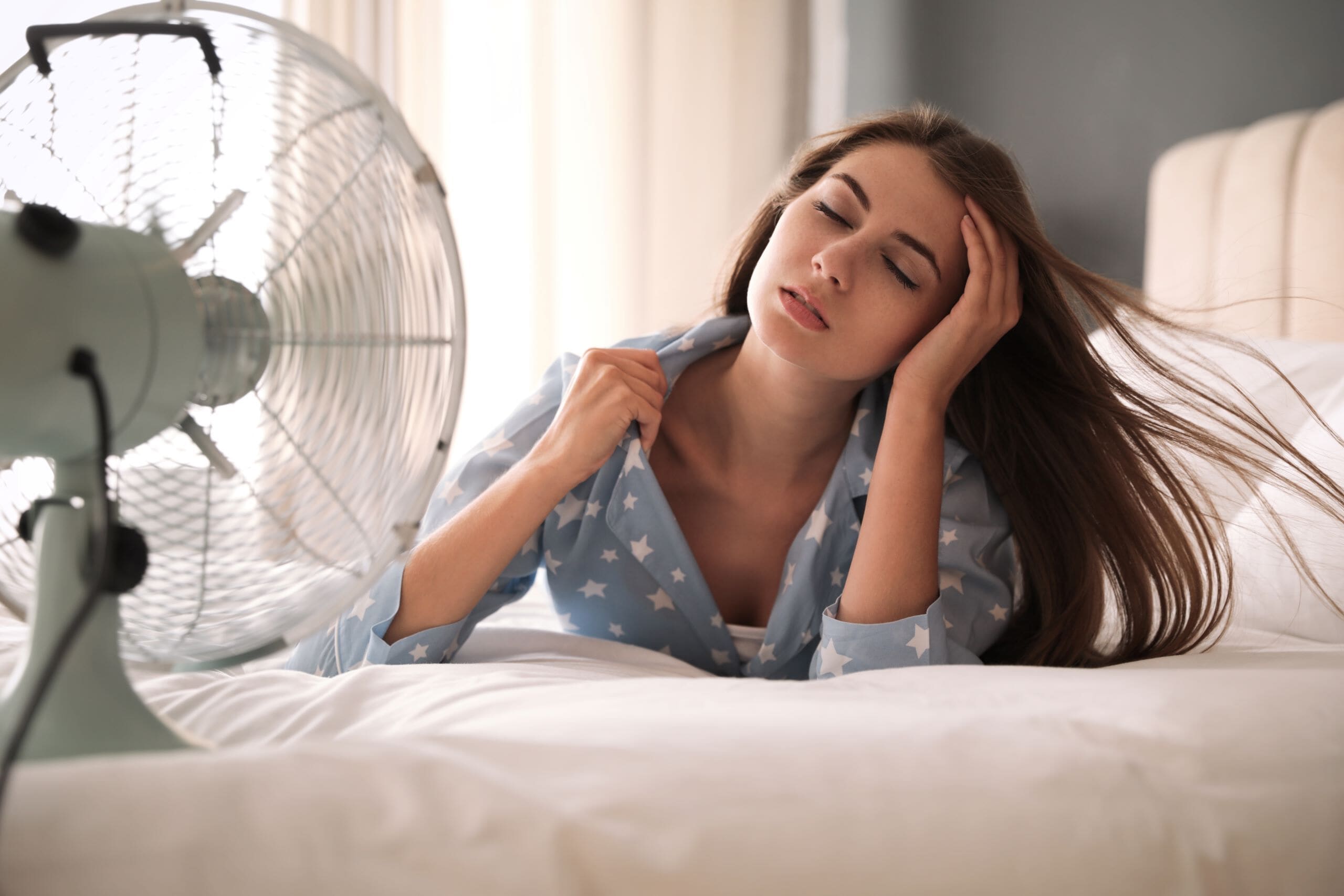
What causes night sweats in menopause
Menopause and night sweats go hand in hand. Night sweats are primarily caused by fluctuating levels of hormones, such as estrogen and progesterone, during the transition to and during menopause. These hormones help your body regulate its temperature, but when they change, your body struggles to do so.
Night sweats and menopause cause sudden hot flashes - where you suddenly feel overwhelmingly warm - and excessive sweating, particularly at night. Hormone levels can change drastically during the night, leaving you waking up in a pool of sweat.
Sweating during the night can have many causes, however it's a very common symptom in women going through menopause. While these symptoms can be overbearing, doctors recommend making some lifestyle changes for at least three months before trying medication to help manage menopause symptoms.
What triggers hot flushes and night sweats in menopause
Although everyone is different, the National Institute of Aging suggests that some factors can increase your chances of experiencing hot flushes and night sweats, such as:
- Drinking alcohol
- Eating spicy food
- Consuming caffeine
- Smoking
How to stop night sweats in menopause
For many, menopause and sleep can feel like an ongoing battle. Around 75%-85% of women will suffer from night sweats during perimenopause and the menopause, so you’re not alone.
To help, Martin Seeley, the CEO and Sleep Expert at MattressNextDay, has shared his top tops on how to stop menopause from disrupting your sleep.
1. Get your room temperature right
Naturally, if your room is too warm, your night sweats will be worse. The recommended bedroom temperature for the best sleep is 18.3°C. A cool bedroom temperature is beneficial for a good night’s sleep for everyone and will help if you're looking for how to stop night sweats in menopause.
With energy bills rising, you might not want to keep a fan on all night, but if you do, put some ice in front of it to disperse a cool breeze.
A low cost way of keeping your bedroom cool is to keep your blinds and curtains shut throughout the day. This will stop the sun coming in and heating the room, so it’ll be cooler for you come nighttime.
Layer your bedding so you can remove sheets when you feel warm. A heavy duvet won’t do you any good, but something like the Emma® Cloud Duvet has temperature regulating properties, which can help keep you cool.
2. Run cold water over your wrists and keep a glass of water nearby
Another way to stop menopause and night sweats wreaking havoc on your sleep is to have a cold glass of water before bed to help cool down your body temperature before you drift off. Keep some cold water on your bedside table that you can easily reach for if you wake up warm in the night. This can also help to soothe a dry mouth and throat during the night when you get too warm.
You can also try taking a cool shower just before bed to lower your body temperature ahead of time.
If you wake up and find yourself really overheated, you can try running cold water over your wrists, where there are lots of blood vessels. This should help you cool down quickly.
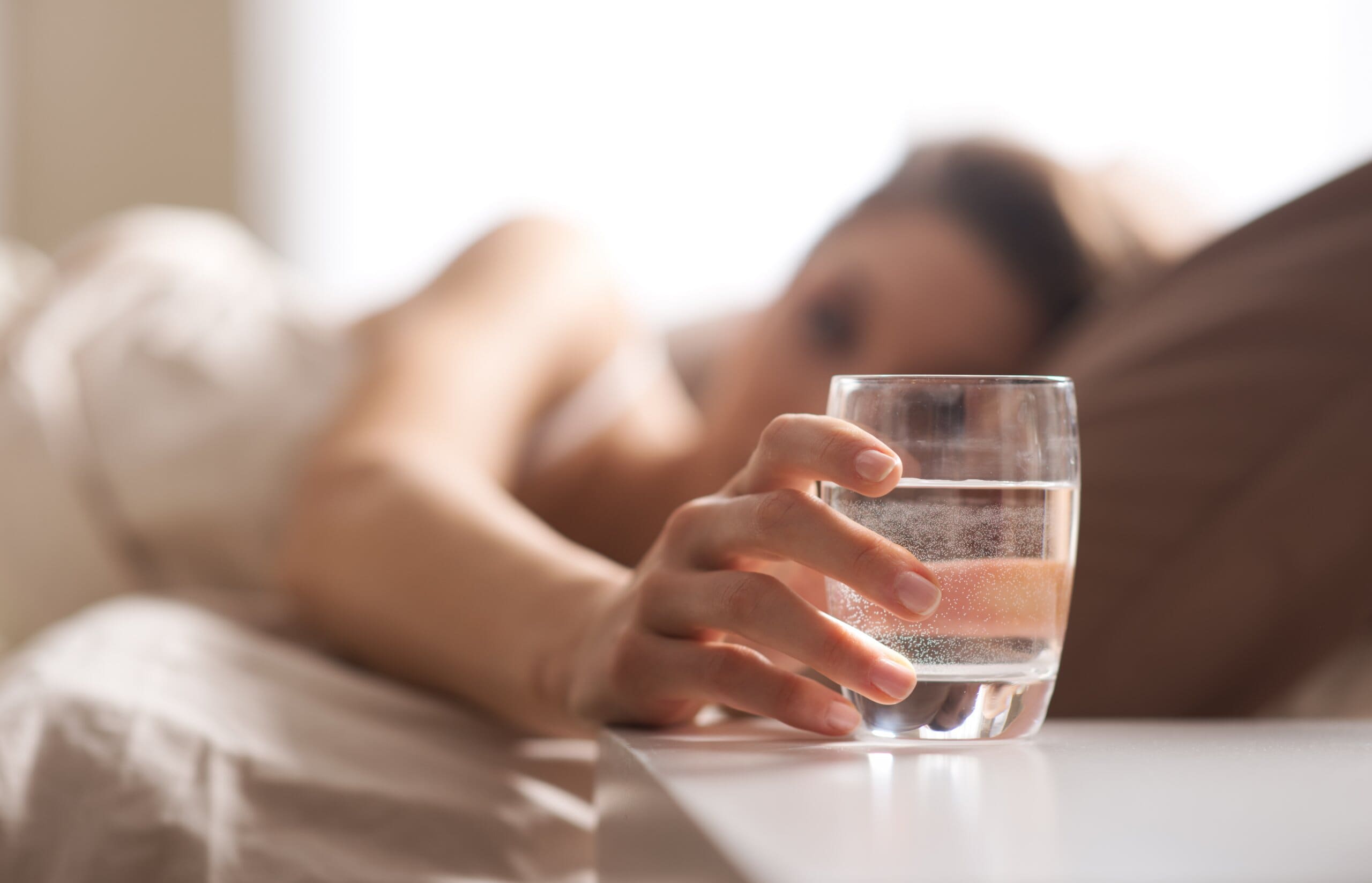
3. Drink more water throughout the day
Another useful way of utilising water to help with hot flushes is to drink at least two litres of water during the day.
This will keep you hydrated and boost your metabolism, putting you in a better mood and helping you sleep deeper, so you’re less likely to wake up during the night.
Drinking enough water during menopause will also help with dryness, including dry skin and vaginal dryness. Drinking plenty of water can also help reduce weight gain associated with menopause.
4. Try mindfulness and meditation
Research has revealed that meditation can help prevent hot flashes and night sweats caused by the menopause. By calming your nervous system, you lower cortisol (stress) levels in your body, which can help to regulate your temperature and sweat production during the night.
A calmer state of mind will also help you deal with the symptoms of menopause more smoothly. You’ll find that you’re less distressed by night sweats and hot flushes by having a more relaxed mindset.
Meditating before bed can be a lifesaver if you struggle to drift off anyway, and a deeper sleep will make you less likely to wake up during the night to any disturbances, including overheating.
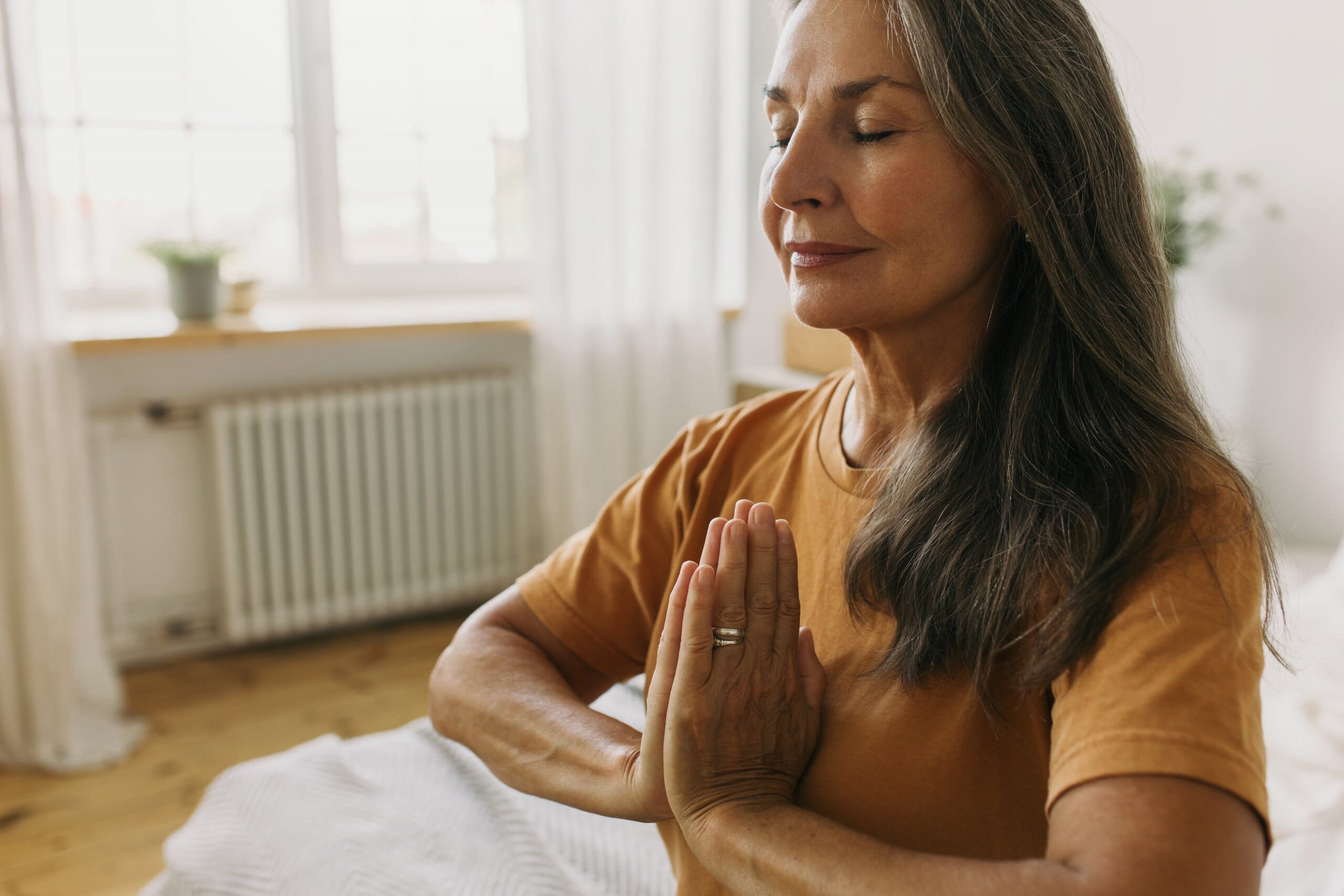
5. Change your duvet cover to a lighter-coloured one
A lighter-coloured bed sheet will reflect light coming into your room, preventing you from overheating. Dark-coloured sheets will absorb heat, adding extra warmth that will make you even more uncomfortable during a hot flush.
Satin or silk pillow cases and bed sheets are incredibly breathable and can be an effective solution for stopping night sweats in menopause. Silk sheets can be a luxurious cooling commodity when you’re suffering from hot flushes.
Our guide to the best bed sheets for hot sleepers can help you find your perfect sleep set-up.
6. Eat more soy products to reduce hot flushes by 79%
Soy contains isoflavones - part of a group of plant-based chemicals called phytoestrogen, that work similarly to estrogen. As your estrogen levels drop and you stop ovulating during menopause, consuming more soy can reduce the frequency and severity of hot flushes.
Studies found that women who incorporated just ½ a cup of cooked soybeans to their diet daily, found that their hot flashes reduced by 79%.
Some foods that contain soy include:
- Edamame (soybeans) - delicious when sprinkled with salt!
- Meat alternatives - often made with tofu or soy protein
- Soya milk - can be added to your tea or coffee in place of dairy (try decaffeinated options, though, to cut down on caffeine as this can trigger hot flashes)
Soy-based products are also low in saturated fats and calories. High in fibre, protein and antioxidants, they can also lower your risk of heart disease.
If you’re not a fan of soy products, there are other foods that contain phytoestrogen, such as flax seeds and even red wine.
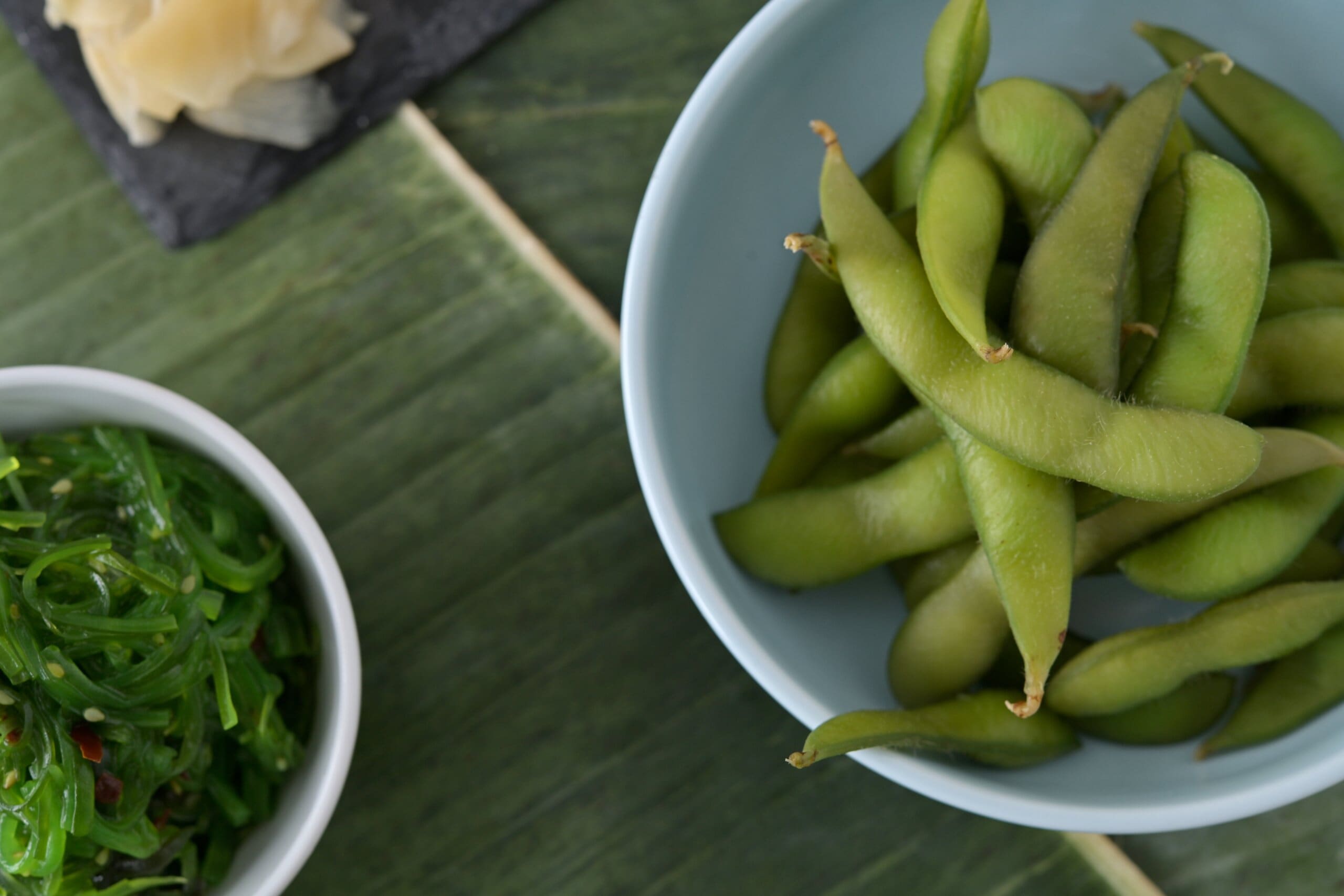
7. Ditch your PJs and sleep naked
Loose, layered pyjamas are beneficial for menopause and night sweats, as you can remove layers during the night if you get too warm. Sleeping naked, however, will help you regulate your temperature even more so. Just use a breathable, light duvet that you can easily whip off if you start to overheat.
There are plenty of benefits to sleeping naked next to your partner, such as the release the chemical oxytocin, otherwise known as the ‘love hormone’. This will increase your bond and have you both enjoying a deeper night’s sleep.
How to overcome sex problems during menopause
In addition to wondering how to stop menopause night sweats, you might also be looking for advice on other bedroom concerns, such as vaginal dryness and reduced sex drive.
Testosterone is responsible for your libido, and your levels of testosterone decline with age, making it harder for you to feel aroused.
Your doctor can prescribe you a testosterone gel or cream after the menopause if they think it will help to increase your sex drive. However, if you’ve had hormone sensitive breast cancer in the past, or have active liver disease, testosterone might not be offered to you.
To help with vaginal dryness, your doctor might suggest oestrogen treatments such as a ring, tablet or cream, all of which you can insert into your vagina.
There is also research to suggest that meditative practices such as sound bathing can increase libido in post-menopausal women.



Living with menopause and night sweats
There are plenty of options out there for lessening the symptoms of the menopause. Medications such as HRT can be something to chat to your doctor about if you’re really struggling. There are also lots of menopause supplements out there that can help your body regulate its temperature, but we’d recommend speaking to your doctor first.
Talking to other women and health professionals about what causes night sweats in menopause can also benefit you massively, and help you feel less alone and anxious. Lots of charities and local groups organise menopause groups where women can meet up to chat about their symptoms and advise one another, so look out for these or ask your doctor for information local to you.
Get a good night's rest with MattressNextDay
With those last points covered, you should hopefully have a much better idea of tips to try when managing the menopause and sleep. And one tip we didn’t cover is just how important it is to have a comfortable bed and sleeping environment as you get older. You can even find a whole range of cooling gel mattresses which can ease your hot flashes massively.
From comfy pocket-sprung mattresses to fancy latex mattress options, we’ve something for everyone in our MattressNextDay range. Why not start browsing today, and don’t forget to visit our buying guides and Snooze News blog for more insightful pieces like this one.
